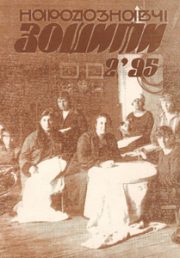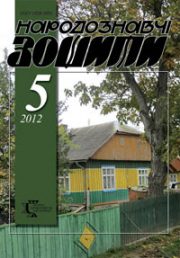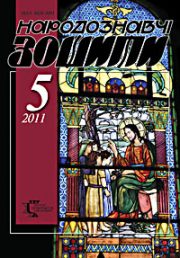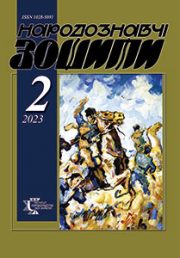The Ethnology Notebooks. 2019, № 3 (147), 557—562
UDK 39+902+2-31]-051(477)”190/200″Ю.Шумовський
DOI https://doi.org/10.15407/nz2019.03.557
PHILOSOPHY OF LIFE AND CREATIVITY OF ETHNOGRAPHER, ARCHEOLOGIST, PRIEST YURII SHUMOVSKYI
YAREMCHYK Valentyna
ORCID ID: https://orcid.org/0000-0003-3445-3027
Post-graduate studentof the department
of the modern ethnologyof the Institute of
Ethnology of the National Academy of Sciences of Ukraine,
15, Svobody Avenue, 79000, Lviv, Ukraine
Contacts: е-mail: v_viktorivna@ukr.net
Abstract. Yurii Shumovskyi is the outstanding figure among Ukrainian archeologists. Through out his life, he combined the work of a priest with the enthusiasm for archeology, which has become a precedent in the world scientific practice. This scientific reflection of the historical phenomenon, namely, Yurii Shumovskyi’s combination of the professional activities of a priest and his favourite occupation that is archeology is an exceptionally significant and topical task of the Ukrainian national historiography. The purpose of the study is to find out Yurii Shumovskyi’s philosophical views that influenced the life and work of a scientist on the basis of the analysis of his works, on theological-religious and historical-church themes. The methodological basis of the research is a complex of interdisciplinary research methods and principles – general scientific and specific – peculiar, in particular, to historical and philosophical sciences: problem-chronological, systemic-structural, philosophical-ideological, phenomenological and, hermeneutic. Based on the results of the analysis of his works, it can be argued that his views were characterized by his own philosophical system of thinking, with a combination of religious and mythological world views. Fascinated by archeology, the priest compared religious knowledge to the one he received in the course of archaeological research. Hence, it follows that the main reason of Father Yurii’s interest in archeology was the desire to learn the truth of human existence not only from the sacred written sources, but also through archeology that could assist in finding material evidence of various forms of religion that affect the identity of each nation which is reflected in their traditions, customs, rituals. During the research, the following philosophical views; activities and creation were taken into consideration: religious, moral and ethical, nationalistic. In conclusion, it should be noted that Yurii Shumovskyi’s philosophy of life and work is a source of genuine humanism. Through his own life, he canonized the high fundamental values: freedom of love, firmness of spirit, dignity, sincerity, the desire for wisdom, reliability, love for God, love for neighbor, love for the homeland. The creative legacy of an ethnographer, archeologist, and priest Yurii Shumovskyi is an inexhaustible source of wisdom and life-giving inspiration not only for the Ukrainian people. It is relevant today and will be pertinent tomorrow because his motto was, «There is no limit to the spiritual perfection of a man».
Keywords: Yurii Shymovskyi, ethnographer, archaeologist, priest, philosophicalviews.
Received 16.03.2019
REFERENCES
Shumovskyi, Yu. (1955). Cult of the Cross among the peoples of the world and in Ukraine. Faith and Culture, 1, 8–16. New York [in Ukrainian].
Shumovskyi, Yu. (1981). Beginning of worship. Ukrainian Orthodox Word, 10, 9–13. NewYork [in Ukrainian].
Shumovskyi, Yu. (1976). A few words about our Church Orthodox worship service. Ukrainian Orthodox Herald, 3, 25–27. New York [in Ukrainian].
Shumovskyi, Yu. (1975). Three-language heresy in the times of St. Cyril and Methodius. Ukrainian Orthodox Word, 6, 8–13. New York [in Ukrainian].
Shumovskyi, Yu. (1994). The destroy ednest, or the history of a priestly family in Volyn (Vol. 1–4). Savanna [in Ukrainian].
Shumovskyi, Yu. (1936). Archaeological monuments in Volyn and way stop reserve them. Church and People, 19, 607–609. Kremenets [in Ukrainian].
Shumovskyi, Yu. (1976, 15 April). Red threat over Africa. Svoboda. Jersey City [in Ukrainian].
Shumovskyi, Yu. (1964). The union of the African peoples. Svoboda. Jersey City [in Ukrainian].
Shumovskyi, Yu. (1965, 26 October). African press. Svoboda. Jersey City [in Ukrainian].
Shumovskyi, Yu. (1963, 30 April, 2 May). The peoples of Africa and their struggle for independence. Svoboda. Jersey City [in Ukrainian].
Shumovskyi, Yu. (1965, 2 September) The problem of the national language in Black Africa. Svoboda. Jersey City [in Ukrainian].
Shumovskyi, Yu. (1964) Africa in fire. America, 22. Pennsylvania [in Ukrainian].
Shumovskyi, Yu. (1989). In the foot steps of long-time Africa. New York [in Ukrainian].
Shumovskyi, Yu. (1965). Ancient Jews and Africa. New Russian Word, 9 [in Russian].
Shumovskyi, Yu. (1974, 7 August). Jewish Emigration in Africa. New Russian Word [in Russian].
Shumovskyi, Yu. (1960, 1 December). The Lost Jewish Tribe in Africa. New Russian Word [in Russian].







